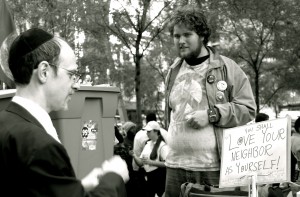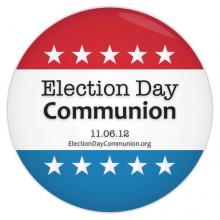Communion
Tuesday, Nov. 6, is Election Day. As we’ve seen these past months, in a closely divided country, elections bring out the worst in us. Hundreds of millions of dollars in negative advertising, families and churches divided, each side convinced that a victory by the other side will be disastrous for the country.
It is clear that Christians will vote in different ways — some for Barack Obama, some for Mitt Romney, some for another candidate, and some will not vote. But Tuesday evening, Christians in more than 800 congregations will be gathering together for communion, regardless of party, political affiliation, or denomination.
The Election Day Communion campaign is the vision of several pastors to build unity in Christ in the midst of theological, political, and denominational differences. In sharing communion together, the Campaign says, Christians can reaffirm our allegiance to Christ and remember some basic truths.
I love food. I love food even more when it's shared with people. Some of my fondest memories with friends and family happened while sharing food. My husband and I shared our first date over a meal, and we got engaged over a meal. There's something about sitting around a table partaking in sustenance for our bodies that also fills our soul and our hearts. That's probably why I love communion so much.
So I was struck by Paul’s anger over food in 1 Corinthians 11. Granted, Paul comes off angry in other letters as well, but this one I decided to linger on for awhile because of verse 27: "Whoever, therefore, eats the bread or drinks the cup of the Lord in an unworthy manner will be answerable for the body and blood of the Lord."
Paul's letter is directed to a community in Corinth that was made up of the poor, the working class, and the rich. They lived together, shared communion with each other, and sought to be a community that reflected Christ. Now, this doesn’t seem too different from what we do at church today. But unlike how we celebrate communion — as it’s own “event” during service — for the 1st century Christians, communion was part of a real meal.
So what could be so "unworthy" about this shared meal?
Every three years, the assigned readings during the summer include five weeks of working our way through the Gopel of John, chapter 6, and what is called the "Bread of Life Discourse." And let’s just say that if Trey Parker and Matt Stone wrote a musical called The Book of John they’d have plenty of material from just this chapter alone.
In the last five weeks we’ve gone from the feeding of the 5,000 to Jesus walking on water in the middle of a storm at sea — by the way, Jesus walks on water during a storm at sea so often in the gospels that I’ve started thinking it was less about being miraculous and more about just getting in some cardio — anyhow, the crowd chased him down, demanding more bread, and then he goes and says that he is the Bread of Life come down from heaven (which angered the nice religious folks), and rather than backing off, he makes it even weirder by saying whoever eats his flesh and drinks his blood has eternal life.
Which is where we pick up today when some of his disciples are like, “Uh Jesus, that teaching is HARD…who can accept it?” And many of them leave. And I have to say, I don’t really blame them.
This teaching IS hard. But honestly, Jesus had a lot of sayings that were HARD. Sayings such as, " Love your enemies and pray for those who persecute you," "You who are without sin cast the first stone," "Sell all you have and give it to the poor," "The first shall be last and the last shall be first," and "If you seek to save your life you will lose it."
I totally understand the reaction of these disciples who say these teachings are hard, who can accept them?
But this week I started to wonder if maybe those disciples didn’t have to leave Jesus … I mean, when we make the accepting of hard teachings the litmus test for being a follower of Jesus, I wonder if we are perhaps missing the point altogether.
THE MOTTO OF RADICAL FAITH always is “now—or never.” If we can’t find divine grace reaching out to us in the here and now, just where we are, then we will never find it. We won’t find it by merely dwelling on the stories and legends of divine interventions in the past. For centuries, the fourth gospel has made people uneasy because it heightens the tension between those who think of religion as loyalty to what has been handed down for us to repeat and those who are prepared to see God right before them and with them now. This month we are asked to immerse ourselves in the very tense sixth chapter of John’s gospel, in which Jesus provokes bafflement and resentment by daring to appropriate to himself the mystique of the manna, the bread from heaven given by God to sustain the Israelites on their journey through the wilderness.
Everyone knew what the bread from heaven was. It was something miraculous embedded in legends of yesteryear, wasn’t it? Quite apart from being scandalized by Jesus’ apparent delusional egomania, the people are unsettled by the way he wrests the whole theme of being fed by God from its safe mummification in legend and miracle, and plants it in the immediate here and now. He forces the question about whether we dare acknowledge our own pangs of hunger for the eternal, and whether we are prepared to receive—eat and drink—the living person of Christ as the gift that will satisfy that hunger.
A Catholic priest who was pulled from ministry after a furor over denying Communion to a lesbian at her mother's funeral insists he did the right thing and criticized the Washington archdiocese for disciplining him.
"I did the only thing a faithful Catholic priest could do in such an awkward situation, quietly, with no intention to hurt or embarrass," the Rev. Marcel Guarnizo said of his decision to withhold Communion from Barbara Johnson during a Feb. 25 funeral Mass for Johnson's mother.
Guarnizo, who issued a statement to conservative Catholic news outlets on Wednesday (March 14), explained that he left the altar for a few minutes during the funeral and did not accompany the family to the cemetery because a migraine attack had left him "incapacitated."
While both sides offer differing accounts, Guarnizo said he learned moments before the funeral at St. John Neumann Catholic Church in Gaithersburg, Md., that Johnson was a lesbian and was attending the Mass with her partner. Guarnizo refused Johnson Communion when she approached the altar during the liturgy.
A Catholic priest who allegedly denied Communion to a lesbian at her mother's funeral has been put on leave pending an investigation of unrelated "intimidating behavior toward parish staff and others," the Archdiocese of Washington said.
The Rev. Marcel Guarnizo, a priest from Moscow who has been serving in the archdiocese since last March, lost his assignment at St. John Neumann Catholic Church in Gaithersburg, Md., on Friday (March 9).
Guarnizo made headlines when Barbara Johnson, a lesbian attending her mother's funeral at the church, said he denied her Communion. At the time, the archdiocese said "issues regarding the suitability of an individual to receive Communion should be addressed by the priest with that person in a private, pastoral setting."
Guarnizo's removal is related to other issues and not the Communion incident, a diocesan spokeswoman said. The archdiocese said an official had received "credible allegations" of Guarnizo's behavior that were considered "incompatible with proper priestly ministry."
 We're in this thing together or we're not in this thing at all.
We're in this thing together or we're not in this thing at all.
We should all be marching in the streets.
We are the 100 percent.
We are poor. We are well-to-do. We are those somewhere in the middle. We are aware of the struggles and unfairness of this world and for this reason we are sensitive to one another's needs. So, we love our neighbors as ourselves.
In his seminal 1974 book Models of the Church, theologian Avery Dulles offered five paradigms, or "models," each of which called attention to certain aspects of the worldwide Christian church. The church, Dulles wrote, is in essence a mystery -- a reality of which we cannot speak directly. Thus we must draw on analogies to understand the church in deeper ways.
Dulles developed five models, drawing on a range of theological schools and traditions, both Protestant and Catholic, to illuminate different aspects of the church. His models included church as institution, mystical communion, sacrament, herald, and servant. Dulles was careful to point out that no single model, by itself, adequately paints a complete picture of the church; each contains important insights about the nature of the church.
During my last year of college, my pastor lent me the book Living Gently in a Violent World, co-authored by Jean Vanier and Stanley Hauerwas. This book is an exploration on how followers of Christ ought to live in broken world.
The introduction of the book recounts the story of Jean Vanier teaching a course on pastoral care. During one class, Vanier asked the students to share some of their spiritual experiences. One of the students, Angela (who was deaf) began to share a dream she had where she met Jesus in heaven. She recalled talking with Jesus for some time and never experiencing so much joy and peace. "Jesus was everything I had hoped he would be," she said, "And his signing was amazing!" Vanier explains to the reader that "for Angela, heaven's perfection did not involve being 'healed' of her deafness. Rather, it was a place where the social, relational, and communication barriers that restricted her life in the present no longer existed."
I went into a Christian bookstore the other day and was surprised to see some of the most prominent display space given over to military flags for the U.S. Army, Navy, Air Force, and Marines. These flags, and a vast assortment of Americana merchandise, were on sale for the holidays.
When I first heard the announcement to rise for "the presentation of the colors," I didn't understand what that was.
[Read more of this blog conversation in response to the Sojourners magazine article "




